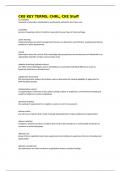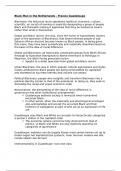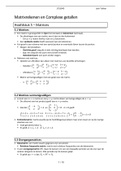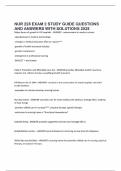Lecture 1 – Chapter 1
Cognition and technology work together to improve human life:
- Technology improved by cognition
- Cognition improved by technology
- Cross-fertilizations!
Cognition: Mental activity, acquisition, storage transformation and use of knowledge.
Cognitive psychology -> cognitive approach (different from behaviorism / Psychodynamic).
Why learn about cognition?
- Cognition occupies a major portion of human psychology.
- Cognitive psychology will help you appreciate many other areas of psychology, as well as
disciplines outside psychology.
- Cognitive psychology provides an "owner's manual" for your mind
Cognitive psychology is the study of cognizing by individual humans, including perception (H2),
attention (H3), memory (H4-5-6), knowledge (H7-8), language(H9-10), reasoning(H12), problem
solving (H11), decision-making (second parts). Cognitive psychology is sometimes used as a synonym
for cognition, and sometimes it refers to a theoretical approach to psychology.
It’s useful to study cognitive psychology because:
• Cognitive activities are a major part of human psychology
• The cognitive approach influences other important areas of psychology
• You can learn how to use your cognitive processes more effectively
Cognitive approach: A theoretical orientation that emphasizes people’s thought processes and their
knowledge.
Philosophical antecedents: The Greeks
Plato (427-347 BC):
- Two ‘worlds’: observable, imperfect world and the eternal, changeless, abstract world of
(perfect) forms/ideas.
- Body is part of physical, ending world, mind (soul) is part of the abstract eternal world (dualism)
- Knowledge:
o Rationalism: Gain knowledge through good thinking (mathematics, philosophy).
o Remembering: mind knows everything (nativism), just remember.
Aristotle (384-322 BC):
- Guided by observations of natural and biological processes
- Rejected plato’s dualism
- Solution: one world, the observable reality
- Change is central: we learn and change by observation (empiricism).
- Aristotle emphasized the importance of empirical evidence, or scientific evidence obtained by
careful observation and experimentation.
,Plato versus Aristotle:
Plato Aristotle
Mind/body Dualism Monism
Knowledge Rationalism Empiricism
Origin of mind Nature (nativism) Nurture
Wilhelm Wundt (1832-1920): Structuralism
- Father of scientific psychology
- Established first psychology lab in 1875 in Germany
- Psychological psychology (experimental) relation between sensation and perception through
introspection. Wundt developed the introspection technique.
- Introspection: In this case it means that carefully trained observers would systematically
analyze their own sensations and report them as objectively as possible, under standardized
conditions.
- Völker psychology: Higher order processes and social processes cannot be studied by
experimentation: too complex, introspection is too fallible.
Early memory research:
- Zeitgeist (wundt): Memory is a higher order process, cannot be studied experimentally
- Ebbinghaus studied his own memory, learning nonsense syllables (ZAF BUQ QUJ)
- US: Calkins discovered recency effect (she argued to study real processes).
o The recency effect is the tendency to remember the most recently presented
information best. For example, if you are trying to memorize a list of items,
the recency effect means you are more likely to recall the items from the list that you
studied last.
William James (1842-1910) Functionalism
- Influential book: ‘principles of psychology’
o Introspection has some issues, and nonsense syllables are not reflecting the real world.
- Aim: to understand functional relationships between stimuli and responses → everyday
experiences rather than decompose cognition in structural aspects.
Behaviorism: Mostly US
- Inspired by functionalism
- Studies the association between stimulus and responses
- Rejected introspection and studies observable behavior only
- Darwin’s influence: Animal experiments.
- The behaviorists helped to develop the research methods used by current cognitive
psychologists.
John B. Watson: founder of Behaviorism 1878 – 1958
- “Behaviorism holds that the subject matter of human psychology is the behavior of human
being. Behaviorism claims that consciousness is neither a definite nor a usable concept.”
- Total rejection of mentalism in scientific psychology (e.g. thinking is simply silent speech).
,B.F. Skinner’s: Radical Behaviorism 1904 – 1990
- Understanding = Control
- Skinner box
- Classical conditioning (Pavlov) versus Operant conditioning (Skinner)
Gestalt psychology: Mostly Europe
- The whole is different from the sum of its parts.
o Wertheimer: e.g. Phi-phenomenon
o Koffka: e.g. Law of Präganz
o The kanisza triangle
Frederik C. Bartlett conducted memory research using
long stories and other meaningful material.
Psychological antecedents →
.
Many historians maintain that Wilhelm Wundt is responsible for creating the discipline of psychology.
Wundt also developed the introspection technique.
Hermann Ebbinghaus and Mary Whiton Calkins conducted early research on human memory.
William James examined numerous everyday psychological processes, and he emphasized the active
nature of the human mind.
Beginning in the early 20th century, behaviourists such as John B. Watson rejected the study of mental
processes. The behaviourists helped to develop the research methods used by current cognitive
psychologists.
Gestalt psychology emphasized that people use organization to perceive patterns, and they often
solve problems by using insight.
Frederick C. Bartlett conducted memory research using long stories and other meaningful material.
Found out that people often added information to a story, remembering inferences that were not
actually stated in the story.
A brief history of cognitive psychology:
- The emergence of Modern Cognitive Psychology
o 1956 and the MIT symposium (Massachusetts institute of technology)
o Ulric Neisser’s Cognitive Psychology
- Factors contributing to the rise of cognitive psychology
o Disappointment with Behaviorism
o Growing interest in linguistics; Noam Chomsky
o Growing interest in human memory research
o Growing interest in developmental psychology; Jean Piaget
▪ Object permanence
o Information processing approach
, Cognitive psychology has had a major influence on the field
of psychology. In the current era, cognitive psychologists
are more concerned about ecological validity than in
previous decades. Involves a heavier focus on studying real-
life issues in natural settings.
The cognitive revolution →
Cognitive psychology began to emerge in the mid-1950s. This new approach was stimulated by
disenchantment with behaviourism, as well as a growing interest in linguistics, human memory,
developmental psychology, and the information-processing approach.
Cognitive science:
Interdisciplinary: cognitive psychology, neuroscience, and artificial
intelligence PLUS philosophy, linguistics, anthropology, sociology, and
economics. Focus on internal representations.
Cognitive science is the interdisciplinary study of internal
representations involved in thinking.
Current issues in cognitive psychology:
Artificial intelligence
- Getting ‘hot’ again…
- Theorists who are interested in AI approaches to cognition typically try to design computer
models that accomplish the same cognitive tasks that humans do.
Pure AI (strong AI)
- Efficiency: Chess computer, language understanding…
- The approach called ‘‘pure artificial intelligence’’ attempts to design programs that can
accomplish cognitive tasks as efficiently as possible.
Computer simulation/Computer Modeling (Weak AI)
- Take human limitations into account (should produce similar errors)
- The approach called ‘‘computer simulation’’ attempts to design programs that accomplish
cognitive tasks the way that humans do.
Theorists who are interested in artificial intelligence (AI) approaches to cognition typically try to design
computer models that accomplish the same cognitive tasks that humans do.
The approach called ‘pure artificial intelligence’ attempts to design programs that can accomplish
cognitive tasks as efficiently as possible.
The approach called ‘computer simulation’ attempts to design programs that accomplish cognitive
tasks the way that humans do.
Social cognitive neuroscience: A study investigating brain structures that are active when a person is
judging whether someone’s face is trustworthy.
Cognition and technology work together to improve human life:
- Technology improved by cognition
- Cognition improved by technology
- Cross-fertilizations!
Cognition: Mental activity, acquisition, storage transformation and use of knowledge.
Cognitive psychology -> cognitive approach (different from behaviorism / Psychodynamic).
Why learn about cognition?
- Cognition occupies a major portion of human psychology.
- Cognitive psychology will help you appreciate many other areas of psychology, as well as
disciplines outside psychology.
- Cognitive psychology provides an "owner's manual" for your mind
Cognitive psychology is the study of cognizing by individual humans, including perception (H2),
attention (H3), memory (H4-5-6), knowledge (H7-8), language(H9-10), reasoning(H12), problem
solving (H11), decision-making (second parts). Cognitive psychology is sometimes used as a synonym
for cognition, and sometimes it refers to a theoretical approach to psychology.
It’s useful to study cognitive psychology because:
• Cognitive activities are a major part of human psychology
• The cognitive approach influences other important areas of psychology
• You can learn how to use your cognitive processes more effectively
Cognitive approach: A theoretical orientation that emphasizes people’s thought processes and their
knowledge.
Philosophical antecedents: The Greeks
Plato (427-347 BC):
- Two ‘worlds’: observable, imperfect world and the eternal, changeless, abstract world of
(perfect) forms/ideas.
- Body is part of physical, ending world, mind (soul) is part of the abstract eternal world (dualism)
- Knowledge:
o Rationalism: Gain knowledge through good thinking (mathematics, philosophy).
o Remembering: mind knows everything (nativism), just remember.
Aristotle (384-322 BC):
- Guided by observations of natural and biological processes
- Rejected plato’s dualism
- Solution: one world, the observable reality
- Change is central: we learn and change by observation (empiricism).
- Aristotle emphasized the importance of empirical evidence, or scientific evidence obtained by
careful observation and experimentation.
,Plato versus Aristotle:
Plato Aristotle
Mind/body Dualism Monism
Knowledge Rationalism Empiricism
Origin of mind Nature (nativism) Nurture
Wilhelm Wundt (1832-1920): Structuralism
- Father of scientific psychology
- Established first psychology lab in 1875 in Germany
- Psychological psychology (experimental) relation between sensation and perception through
introspection. Wundt developed the introspection technique.
- Introspection: In this case it means that carefully trained observers would systematically
analyze their own sensations and report them as objectively as possible, under standardized
conditions.
- Völker psychology: Higher order processes and social processes cannot be studied by
experimentation: too complex, introspection is too fallible.
Early memory research:
- Zeitgeist (wundt): Memory is a higher order process, cannot be studied experimentally
- Ebbinghaus studied his own memory, learning nonsense syllables (ZAF BUQ QUJ)
- US: Calkins discovered recency effect (she argued to study real processes).
o The recency effect is the tendency to remember the most recently presented
information best. For example, if you are trying to memorize a list of items,
the recency effect means you are more likely to recall the items from the list that you
studied last.
William James (1842-1910) Functionalism
- Influential book: ‘principles of psychology’
o Introspection has some issues, and nonsense syllables are not reflecting the real world.
- Aim: to understand functional relationships between stimuli and responses → everyday
experiences rather than decompose cognition in structural aspects.
Behaviorism: Mostly US
- Inspired by functionalism
- Studies the association between stimulus and responses
- Rejected introspection and studies observable behavior only
- Darwin’s influence: Animal experiments.
- The behaviorists helped to develop the research methods used by current cognitive
psychologists.
John B. Watson: founder of Behaviorism 1878 – 1958
- “Behaviorism holds that the subject matter of human psychology is the behavior of human
being. Behaviorism claims that consciousness is neither a definite nor a usable concept.”
- Total rejection of mentalism in scientific psychology (e.g. thinking is simply silent speech).
,B.F. Skinner’s: Radical Behaviorism 1904 – 1990
- Understanding = Control
- Skinner box
- Classical conditioning (Pavlov) versus Operant conditioning (Skinner)
Gestalt psychology: Mostly Europe
- The whole is different from the sum of its parts.
o Wertheimer: e.g. Phi-phenomenon
o Koffka: e.g. Law of Präganz
o The kanisza triangle
Frederik C. Bartlett conducted memory research using
long stories and other meaningful material.
Psychological antecedents →
.
Many historians maintain that Wilhelm Wundt is responsible for creating the discipline of psychology.
Wundt also developed the introspection technique.
Hermann Ebbinghaus and Mary Whiton Calkins conducted early research on human memory.
William James examined numerous everyday psychological processes, and he emphasized the active
nature of the human mind.
Beginning in the early 20th century, behaviourists such as John B. Watson rejected the study of mental
processes. The behaviourists helped to develop the research methods used by current cognitive
psychologists.
Gestalt psychology emphasized that people use organization to perceive patterns, and they often
solve problems by using insight.
Frederick C. Bartlett conducted memory research using long stories and other meaningful material.
Found out that people often added information to a story, remembering inferences that were not
actually stated in the story.
A brief history of cognitive psychology:
- The emergence of Modern Cognitive Psychology
o 1956 and the MIT symposium (Massachusetts institute of technology)
o Ulric Neisser’s Cognitive Psychology
- Factors contributing to the rise of cognitive psychology
o Disappointment with Behaviorism
o Growing interest in linguistics; Noam Chomsky
o Growing interest in human memory research
o Growing interest in developmental psychology; Jean Piaget
▪ Object permanence
o Information processing approach
, Cognitive psychology has had a major influence on the field
of psychology. In the current era, cognitive psychologists
are more concerned about ecological validity than in
previous decades. Involves a heavier focus on studying real-
life issues in natural settings.
The cognitive revolution →
Cognitive psychology began to emerge in the mid-1950s. This new approach was stimulated by
disenchantment with behaviourism, as well as a growing interest in linguistics, human memory,
developmental psychology, and the information-processing approach.
Cognitive science:
Interdisciplinary: cognitive psychology, neuroscience, and artificial
intelligence PLUS philosophy, linguistics, anthropology, sociology, and
economics. Focus on internal representations.
Cognitive science is the interdisciplinary study of internal
representations involved in thinking.
Current issues in cognitive psychology:
Artificial intelligence
- Getting ‘hot’ again…
- Theorists who are interested in AI approaches to cognition typically try to design computer
models that accomplish the same cognitive tasks that humans do.
Pure AI (strong AI)
- Efficiency: Chess computer, language understanding…
- The approach called ‘‘pure artificial intelligence’’ attempts to design programs that can
accomplish cognitive tasks as efficiently as possible.
Computer simulation/Computer Modeling (Weak AI)
- Take human limitations into account (should produce similar errors)
- The approach called ‘‘computer simulation’’ attempts to design programs that accomplish
cognitive tasks the way that humans do.
Theorists who are interested in artificial intelligence (AI) approaches to cognition typically try to design
computer models that accomplish the same cognitive tasks that humans do.
The approach called ‘pure artificial intelligence’ attempts to design programs that can accomplish
cognitive tasks as efficiently as possible.
The approach called ‘computer simulation’ attempts to design programs that accomplish cognitive
tasks the way that humans do.
Social cognitive neuroscience: A study investigating brain structures that are active when a person is
judging whether someone’s face is trustworthy.











